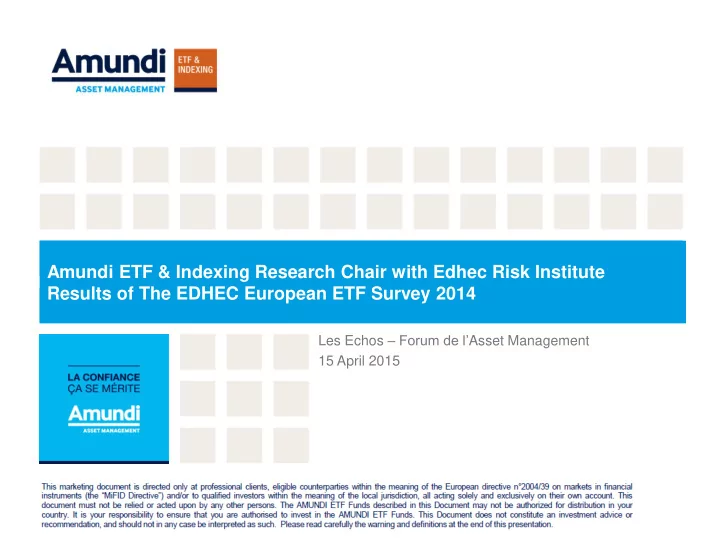

d’utilisation n’apparaîtront ni à Amundi ETF & Indexing Research Chair with Edhec Risk Institute l’impression ni à la Results of The EDHEC European ETF Survey 2014 Les Echos – Forum de l’ Asset Management 15 April 2015
Introduction Amundi ETF & Indexing is pleased to share with you the results of the EDHEC European ETF Survey 2014, a comprehensive survey of 222 European ETF investors. This survey was conducted as part of the Amundi ETF & Indexing research chair at EDHEC- Risk Institute on “Core -Satellite and ETF Investment .” The EDHEC European survey 2014 was conducted from 2nd October 2014 to 19th November 2014 with an online questionnaire and was diffused to European professionals in the asset management industry. The responses were collected from 222 respondents, that together have at least € 3,350 billions of AUM. Respondents were from 27 European countries. Almost half of respondents (47%) were from UK, Switzerland and France, the other 53% being distributed between 24 European countries. 78 % of respondents’ institution main activity is institutional investment and about 19% of respondents belong to the private wealth management industry. d’un Pour remonter d’un 2 15/04/2015
High satisfaction with ETFs Satisfaction with standard ETFs has remained at high levels. d’un This exhibit indicates the percentages of respondents that are satisfied with ETFs or ETF-like products for different asset classes over time. Pour remonter d’un 3 15/04/2015 Source : EDHEC European ETF Survey 2014 (published in March 2015 )
Perspective of further increase in the use of ETFs • It appears that ETFs investors are still looking to increase (about 60% of them since 2011) or at least to maintain their use of ETFs and have a more favourable outlook of their use of ETFs than of their use of alternative indexing products. d’un This exhibit indicates the future potential to change each of the mentioned products by investors over time. Pour remonter d’un 4 15/04/2015 Source : EDHEC European ETF Survey 2014 (published in March 2015 )
Motivations for further increase in the use of ETFs • 64% of respondents declare that increasing the use of ETFs will serve as a substitute to the use of active managers; 42% of them will substitute ETFs to the use of other index products. • This replacement will first of all be motivated by costs for a vast majority of respondents (70%), but also by performance (45%), while liquidity and transparency are the last criteria given (38% and 37% of respondents, respectively). d’un Pour remonter d’un 5 15/04/2015 Source : EDHEC European ETF Survey 2014 (published in March 2015 )
Usage of ETFs by investors It appears that investment in ETFs is mainly associated with a long-term exposure to broad market indices. d’un Pour remonter d’un This exhibit indicates the percentages of respondents frequently using ETFs for each of the mentioned purposes over time. 6 15/04/2015 Source : EDHEC European ETF Survey 2014 (published in March 2015 )
The success of passive smart beta products A quarter of respondents (25%) already use products tracking smart beta indices; and two-fifth of them (40%) consider investing in such products in the near future. d’un This exhibit indicates the percentages of respondents that reported to use products tracking smart Pour remonter d’un beta indices. 7 15/04/2015 Source : EDHEC European ETF Survey 2014 (published in March 2015 )
Motivations for investment in smart beta ETFs This exhibit indicates the percentages of respondents that agree or strongly agree with the statements about smart beta indices. • 71% of respondents think that smart beta indices provide significant potential to outperform cap- weighted indices in the long term. • 81% of respondents think that they avoid cap-weighted indices being concentrated in very few stocks or sectors. d’un • 82% of respondents agree that smart beta indices allow factor risk premia, such as value and small cap to be captured. Pour remonter d’un • 88% agree that smart beta indices require full transparency on methodology and risk analytics. 8 15/04/2015 Source : EDHEC European ETF Survey 2014 (published in March 2015 )
Conclusion This survey shows that there is still a bright future for further developments of ETFs (55% of respondents plan to increase their use of ETFs). The area of most interest to respondents in terms of product developments appears to be innovations in traditional asset classes, with demands on ETFS based on smart beta equity (37% of respondents), factor investing (31% of respondents), equity style (29% of respondents) and smart beta bond (27% of respondents). There is less perspective of development in new asset classes (real estate, infrastructure, hedge funds), not necessarily suited to these supports. d’un Pour remonter d’un 9 15/04/2015 Source : EDHEC European ETF Survey 2014 (published in March 2015 )
Appendix Country distribution of respondents Function of respondents Main activity of respondents Asset under management (EUR) d’un Pour remonter d’un All percentages are based on the 222 replies to the survey. 10 15/04/2015 Source : EDHEC European ETF Survey 2014 (published in March 2015 )
Recommend
More recommend